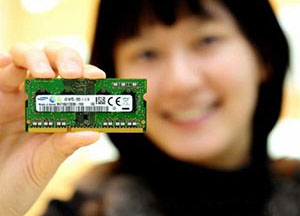Since the beginning of this year, the semiconductor market has been fluctuating due to rising memory semiconductor prices and insufficient supply of semiconductors for vehicles. It is predicted that this year’s semiconductor sales will grow more than double digits from last year.
According to the industry on the 7th, global market research firm IC Insights, out of 33 products defined by the World Semiconductor Trade Statistics (WSTS) organization, in a recently published report, increased DRAM and NAND flash sales by 18% and 17%, with growth rates 1 and 2 I predicted that I would write the above.
This is 5-6 percentage points higher than the 12% growth rate of the overall semiconductor market expected by IC Insights this year.
DRAM, which recorded a negative growth of -37% due to price decline in 2019, turned to growth last year as demand surged due to telecommuting, remote classes, and online commercial expansion due to the novel coronavirus infection (Corona 19).
In this year’s semiconductor market, there are many observations that a semiconductor supercycle (long-term boom) will arrive centering on DRAM.
Server DRAM, which accounts for a large portion of DRAM sales, is showing a decreasing trend in customer inventory, and suppliers such as Samsung Electronics and SK Hynix are also expecting conservative investments to increase prices.
NAND Flash sales increased by 24% last year due to the expansion of servers by laptops, tablets and cloud companies, but growth is expected to continue this year due to this atmosphere and the conversion of 5G smartphones.
Samsung Electronics and SK Hynix, which are leading the DRAM and NAND flash markets, are expected to improve their earnings.
In fact, in a survey of Taiwan’s market research firm Trend Force and DRAM Exchange, the fixed price (transaction price between companies) of DRAM for PC and DRAM for servers turned upward at the same time last month.
The current DRAM spot transaction price has risen to a level of more than 20% compared to the fixed transaction price in December, and the fixed price is expected to continue to rise for the time being. In general, the market spot price precedes the trend of fixed prices between companies.
After memory semiconductors, the automotive semiconductor market is expected to grow 16% this year.
Recently, the supply shortage of automotive semiconductors in the global market is intensifying.
This is because automotive semiconductor companies in Europe and Japan, such as the Netherlands and Germany, turned production to high-margin consumer (B2C) products such as smartphones, PCs, TVs, and home appliances instead of semiconductors for vehicles when automobile sales fell sharply in the first half of last year due to Corona 19.
GM, the largest automobile company in the United States, stopped operating three US plants due to a shortage of semiconductors, and began cutting production in Korea. It is reported that Volkswagen, Audi, Ford, Toyota, and Honda have also started reducing production of some models.
IC Insights predicted, “With the development of self-driving cars and the expansion of electric car sales, along with such a shortage of supply, the price of semiconductors for vehicles installed in new cars this year will increase by more than $550 on average.”
The supply shortage of automotive semiconductors is expected to continue for some time.
Kim Dong-won, an analyst at KB Securities, predicted that “the US and Taiwanese governments are holding an emergency meeting and demanding expansion from foundry companies such as TSMC, but the supply shortage will continue for six months.”
Samsung Electronics’ movement is also of interest. At Samsung Electronics, automotive semiconductors account for insignificant proportion of total sales. However, the industry believes that there is a possibility that Samsung Electronics will expand its automotive semiconductor line, considering the trend of future automotive semiconductor price hikes.
There are many speculations in the market that it will acquire a global automotive semiconductor company while Samsung Electronics has officially formulated a merger and acquisition (M&A) in the future.
Industry Team [email protected]
<저작권자 © 전파신문, 무단 전재 및 재배포 금지>
